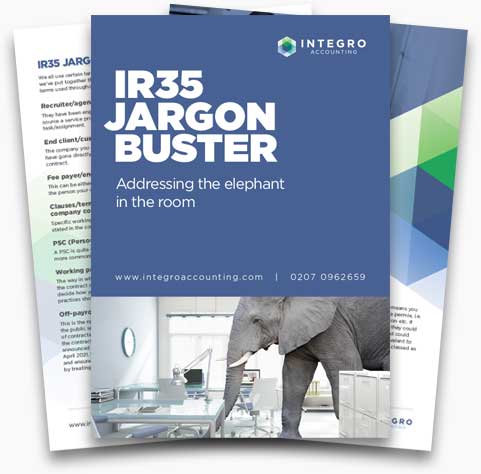What is IR35?
IR35 is a legislation that was introduced in April 2000. The legislation was introduced to ensure contractors did not contract through what HM Revenue and Customs define as ‘disguised employment’.
If you need help in determining your IR35 status, we can help. All clients are provided a FREE IR35 Review complete with a comprehensive downloadable report. Click here for more information: FREE IR35 Review.
What is ‘disguised employment’?
Permanent employees would resign from their current job and then return a few days later, to the same role, but as a limited company contractor. They would have all the benefits of a permanent employee and would also benefit from the tax saving opportunities that came with being a limited company owner and because of this HMRC introduced IR35 to prevent people working under disguised employment.
As a contractor, your work is temporary which means you don’t have the same rights as permanent employee. For example: sick leave, holiday pay, company pension, healthcare etc. therefore, it is only fair that you benefit from greater tax relief. If caught, the disguised employee would be required to pay full NI and tax to that of a permanent employment. This is classed as ‘Inside IR35′.


How will I know if I am inside or outside or IR35?
When accepting a contract role, you should consider if your contract follows any of the following clauses:
- Substitute – does the fee payer solely want you to complete the work? I.e. they will not allow a substitute to be sent from your company.
- Obligation – is the fee payer always required to provide you work? If there are periods of the contract where you are not required to work, there is no obligation for the end client to provide you with work or pay you.
- Control – are you under direct supervision from the end client? Naturally there will be a level of reporting and input that needs providing to senior level in the company, but ultimately you as a company should not be under anyone’s direct control and supervision.
If you answer ‘yes’ to any of the above clauses, we recommend speaking to an expert adviser.
Every contract and sector is unique so there really is no size fits all for the above ‘clauses’.This is why we always advise to seek expert advice specifically tailored to you. For more guidance on IR35 visit speak to one of our accountants for a FREE verbal IR35 review on 0207 0962659 or complete our call back request form here.
What to do if you are inside IR35?
Many people immediately switch to an umbrella solution if their contract is inside IR35, but is that the smartest thing to do? After all, the nature of a contractor’s work is temporary, so who’s to say that your next contract won’t be outside IR35? Working through your own Limited Company is still the most tax efficient way of trading and could still save you more of your hard earned money than contracting through an umbrella company.
Your take home pay could still be higher in a limited company as you’ll have the ability to generate extra income through the Flat Rate VAT Scheme. A few things to consider as a contractor:
- You only pay tax on 95% of your income rather than 100% via an umbrella company.
- Umbrella company fees can often eclipse limited company accountancy fees.
- Limited companies allow you to claim for a wider range of expenses, which can be offset against your overall tax liability.
Our accountants have a wealth of experience in dealing with contractors who are inside IR35, so do not hesitate to contact us if you want to find out more about the tax implications.

To arrange your IR35 review, speak to our expert accountants
0207 0962659 | info@integroaccounting.com | Request a callback
IR35 – Public Vs Private Sector
History timeline on IR35:
2000
Contractor working in both the public and private sector had sole responsibility on determining whether their contract was inside or outside or IR35.
2017
Off-payroll working rules (IR35) for public authorities was introduced. This meant that contractors working within the public sector, would automatically be determined as inside IR35. Therefore, the end client/introducer bringing in the contractor will now need to determine their working practices in the following sectors before starting their contract (stated by HMRC):
government departments and their executive agencies
many companies owned or controlled by the public sector
schools and universities
local authorities
the National Health Service (NHS)
2018
In the 2018 Budget it was announced that from April 2020 the off payroll working rules for public authorities would be rolled out to private sector businesses. Quite simply, this means that instead of the contractor or consultant being the decision maker, the recruiter or ‘introducer’ would now need to determine their placements status before starting the contract. This rule is yet to be finalised by HMRC, so is subject to change.
IR35 has had many changes in recent years, however this does not stop the contractor market from growing. In March 2019 companies house released the latest results in new company formations. Currently the market stands at having over 4 million companies incorporated, with year on year growth. Despite seasonal changes, new company incorporation’s have continued to increase since 2012.
2020
On Tuesday 17th March, Steve Barclay, the chief secretary to the Treasury stated that due to the spread of the Covid-19 (coronavirus) outbreak, the IR35 off payroll reform in the private sector will now be delayed. This will now move from April 2020 to April 6th 2021.

